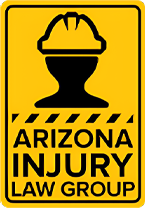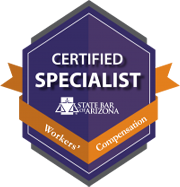A Specialized Workers’ Compensation Law Firm is a Better Choice


In an earlier blog post, we discussed the potential downsides of pursuing a workers’ compensation case in Arizona without a lawyer. You may be giving up benefits that you didn’t even know you had.
But which lawyer is best for you? You could choose from among the many outstanding personal injury firms throughout Arizona, a number of which hold themselves out as being qualified to handle workers comp cases as well. On its face, this seems reasonable. After all, in both instances, an injured individual is seeking monetary compensation.
But in fact, there are a number of significant differences that make a workers’ comp specialty firm a better option.
‒ First, although both personal injury and workers comp claims do indeed involve an injured individual and potential monetary awards, that’s about where the similarities end. Workers’ comp cases are decided based on a separate body of statutes and cases and are otherwise different in numerous ways.
‒ Arizona attorneys may earn a specialization certification in a number of areas of law, including workers comp. However, most personal injury firms do not have such specialists.
‒ In a personal injury suit, the defendant’s fault (or lack of it) is usually an issue. Without evidence that the defendant’s carelessness caused the plaintiff’s injuries, there is no legally recognized claim.
‒ By contrast, workers’ compensation in Arizona and elsewhere is a “no-fault” system in which benefits are payable to an otherwise qualified injured employee regardless of whether his or her employer was at fault. By eliminating the need to prove negligence, most comp claims can be resolved quickly. Lawsuits can drag on for years.
‒ There are no approved amounts that a jury can award in most personal injury suits. In addition to compensation for lost income and medical expenses, a jury may compensate the plaintiff for pain and suffering and other so-called “general” damages. Punitive damages may also be awarded. In a workers’ comp case, the injured employee receives no payment to compensate for pain and suffering, so no evidence is needed.
‒ A workers’ comp claimant receives periodic payments which are a specified percentage of his or her salary. In addition, however, unless the insurer and claimant agree to a lump sum settlement, approved medical expenses are paid by the insurer on an ongoing basis, sometimes for many years. In a personal injury case, future medical costs not covered by private insurance or Medicare are usually the plaintiff’s responsibility, even if the amount awarded or accepted in settlement turns out to be inadequate to cover them.
‒ The great majority of legitimate personal injury cases are settled, with the plaintiff accepting a lump sum payment in exchange for a full release of liability. Indeed, plaintiffs’ firms generally try cases only when settlement proves to be impossible. Whether by settlement or verdict, however, once the case is concluded, the formal relationship between lawyer and client usually ends. Because monetary benefits and medical treatment may continue for months or even years, a worker’s comp firm is “in it for the long haul”.
‒ The firm should, for a reasonable fee, be able and willing to keep track of a claimant ’s payments and medical treatment history. Few personal injury firms are able to efficiently provide this ongoing service. Some will do so, but also charge a significant percentage of each compensation payment as a fee.
Get Help Today
Call Immediately For A Free, No Obligation Consultation And Let Us Help You Put Your Life Back On Track. Let Us Help You
Regain Normalcy And Stability Again. We Want To Help You Get The Benefits You Need And Deserve!


